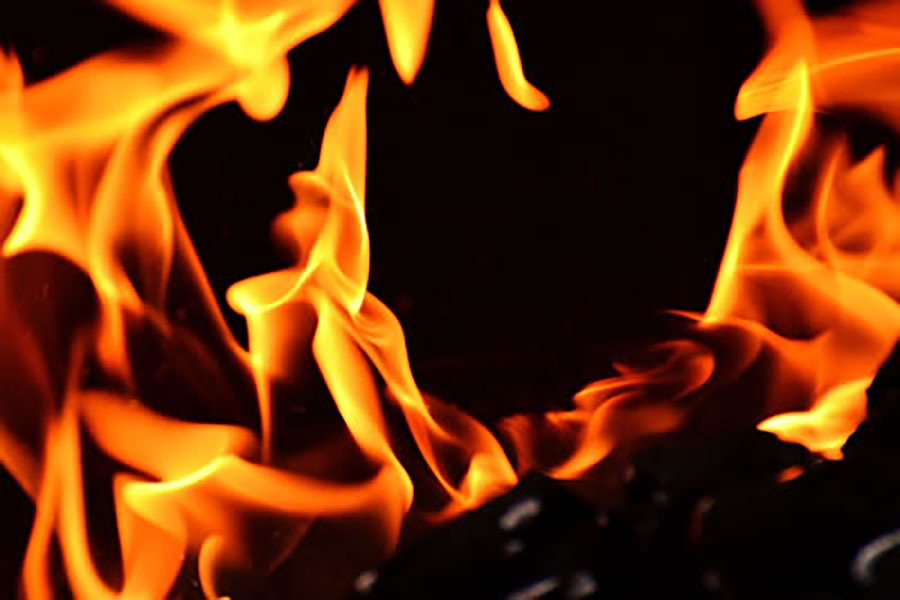
20th Sunday in Ordinary Time, Year C
by Fr. Samuel Aliba | 08/14/2025 | Pastor's LetterMy Dearly Beloved in Christ;
The words of Jesus in today's gospel reading can be a bit unsettling. He said to His disciples: "I have come to set the earth on fire, and how I wish it were already blazing..." (Luke 12:49) Then again, He speaks of causing division and struggle within families (verse 51). These pronouncements from Jesus seem to run contrary to one of his messianic titles as "Prince of Peace."What does Jesus really mean?
It is pertinent to state that the fire, which Jesus speaks about, is not a destructive fire, but the fire of Divine love and presence. This fire is the fire of the Holy Spirit and the light of grace. It is the fire that sets cold and lukewarm hearts ablaze; a fire that purifies and a fire that shines in the dark. It is the fire of the Word of God that burns like a torch (Sirach 48:1; cf. 1 Kings 18:38-39; Luke 24:32); and it is the fire of baptism that transforms those who experience it (Luke 1:17; 3:16). It is also the fire of the Holy Spirit that empowered the Apostles on the day of Pentecost (Acts 2:3-4).
It is pertinent to state that the fire, which Jesus speaks about, is not a destructive fire, but the fire of Divine love and presence. This fire is the fire of the Holy Spirit and the light of grace. It is the fire that sets cold and lukewarm hearts ablaze; a fire that purifies and a fire that shines in the dark. It is the fire of the Word of God that burns like a torch (Sirach 48:1; cf. 1 Kings 18:38-39; Luke 24:32); and it is the fire of baptism that transforms those who experience it (Luke 1:17; 3:16). It is also the fire of the Holy Spirit that empowered the Apostles on the day of Pentecost (Acts 2:3-4).
Furthermore, the fire that Jesus talks about is the fire that differentiates between those who stand on the side of truth from those who stand against the truth. It is a fire that defines and a fire that divides; the fire defines the children of light and creates a division between those whose faith is on fire and those who have a stone-cold faith. Hence, if such a fire is ignited in the heart of a believer who lives amidst unbelievers or lukewarm believers, divisions and conflicts are bound to occur.
Conflicts can arise in the family when one member desires to follow Christ and enter His Church or when a family member renounces the faith he or she was nurtured in to profess another faith. Such decisions often lead to varying degrees of conflicts, strife and quarrels among family members which may eventually lead to division as Jesus foretells. Nevertheless, all these forms of conflict need to be borne in union with Christ, who suffered the Cross for us. Ultimately, the family of God trumps the natural family, as John Bergsma puts it.
With the benefits of hindsight, we realize that salvation history is full of familial conflicts that have their origins in differing relationships to God. Cain envied Abel's intimacy with God and slew him. Jacob wanted the promises of the covenant whereas Esau despised them. Joseph's brothers sought to kill him out of offense at his prophetic dreams. Moses's own brother and sister tries to remove him from leadership over Israel out of envy of His prophetic status. And many other examples could be cited, including Jeremiah in today's first reading who endured varying degrees of opposition and persecution from Kith and Kin. The steadfastness with which these biblical characters remained in their relationship with God should inspire us.
Dear friends in Christ, being a Christian demands a radical approach to God. As much as family is important, serving God leaves no room for compromise. We cannot avoid the division that must come or the hatred of others in our determination to seek first God's kingdom. Like Jeremiah in our first reading, we shall surely face persecution but everything we suffer is a form of fire that purifies us from impurities just as gold is purified by fire. Let Love Lead!
In Christ;
-Fr. Samuel Aliba
BACK TO LIST